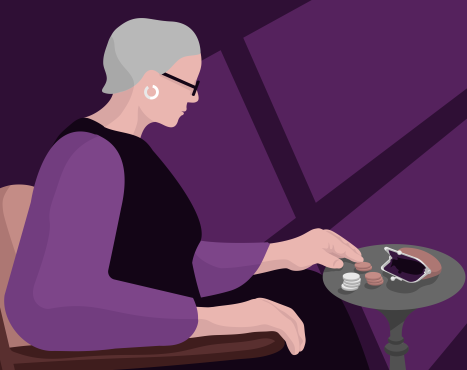Poverty Report 2023

Published on 12 October 2023 07:48 AM
- Almost a quarter, (24%) of over 50s currently live in poverty, compared to 19% in the rest of England
- If poverty rates were the same as the rest of England, some 125,000 fewer older Londoners would be in poverty
- Age UK London says older people are missing meals, living without heating and are scared about what is ahead
Almost a quarter (24%) of older Londoners are now living in poverty, according to the latest data released by Age UK London. This is higher than the rest of England, where the figure is currently 19%. The number of people living in poverty in London over the age of 50 has increased by 5% over the past decade. The charity says this highlights the urgent need for decision makers to address the financial struggles faced by older residents in the capital as many are now skipping meals and going without heating to save money.
The data shows that, if poverty rates for over 50s in London were the same as the rest of England, some 125,000 fewer older Londoners would be in poverty. This figure emphasises the impact that targeted interventions and support systems could have towards improving the quality of life for older people in London.
The report also shows that almost half (46%) of older Londoners living in social housing are living in poverty. One older person who spoke to the charity who wanted to remain anonymous said “The cost of living is worrying to old people and there is nothing you can do about it. If you are poor and everything is going up, it is really scary.”
This second poverty report published by the charity highlights that poverty rates are consistently much higher for single pensioners and have been, throughout the past decade. Almost a third, (30% )of single pensioners live in poverty, an increase of nearly 10 percentage points since 2013/14. By contrast, poverty rates for couples of state pension age are significantly lower at 18% and have fallen slightly.
Launched ahead of London Challenge Poverty Week (16-22 October), Age UK London hopes the report will motivate London’s decision makers to do more to take older Londoners out of poverty.
The Mayor’s campaign earlier this year encouraged older Londoners to apply for support and resulted in the take up of £8.4 million in unclaimed Pension Credit. Despite the campaign successfully increasing uptake, Age UK London warns that the levels were lower than the rest of the country. They are recommending that local authorities review the effectiveness of current approaches to increase uptake of Pension Credit in their borough.
Abi Wood, CEO of Age UK London said: “This report highlights the increasing levels of poverty amongst older Londoners and the alarmingly growing, disparity in poverty, fuel poverty and food insecurity rates in London. It also underscores the pressing need for affordable and accessible housing options, as well as comprehensive measures to alleviate poverty among this vulnerable demographic.”
Age UK London are also concerned with the figures relating to older private renters with poverty rates at 28%. Despite this being a drop from a pre-pandemic peak of 34%, the number of older renters in poverty remains nearly two times the rate of their home-owning peers at 16%. One older person said “I’m very scared of how I will get through the winter and keep warm. I fear losing my (privately rented) home because I cannot cope with the rising cost of living.”
Wood concluded: “There is still a long way to go to tackle poverty amongst older Londoners - the capital, one of the richest cities in the world, continues to have the highest poverty rates of any region of the UK and it has increased instead of fallen over the past decade. Comparing rates against other age groups where poverty has fallen, we are hearing from our older generation that they are really struggling.”
You can read the report here.
-ends-
For further press information and interviews contact Dee Byrne at dbyrne@ageuklondon.org.uk or call 07986 378358
Editor’s notes:
Poverty in the UK: The Minimum Income Standard identifies what incomes different households require to reach a minimum socially acceptable living standard. Households are below the UK poverty line if their income is 60% below the median household income after housing costs for that year.
